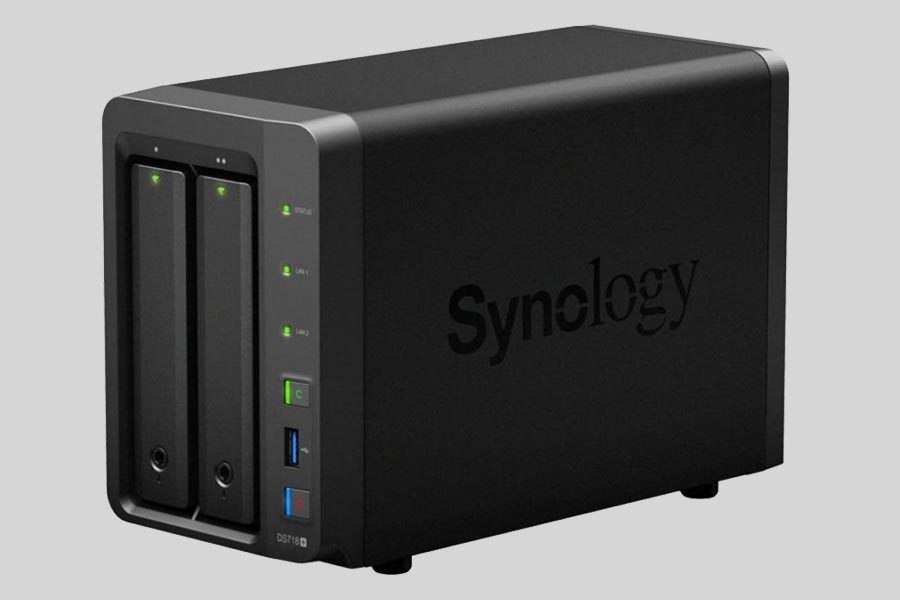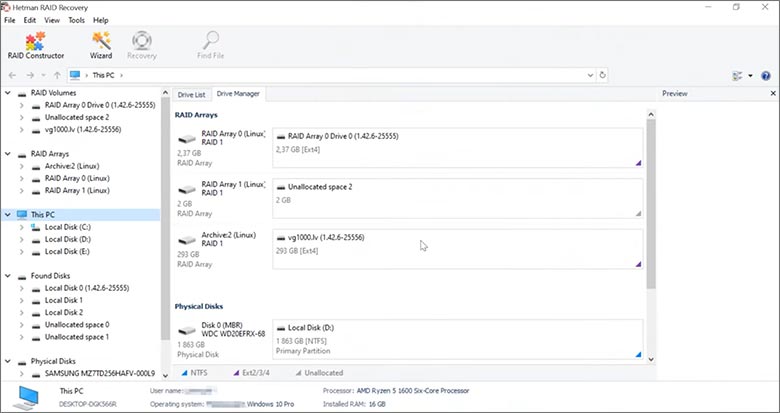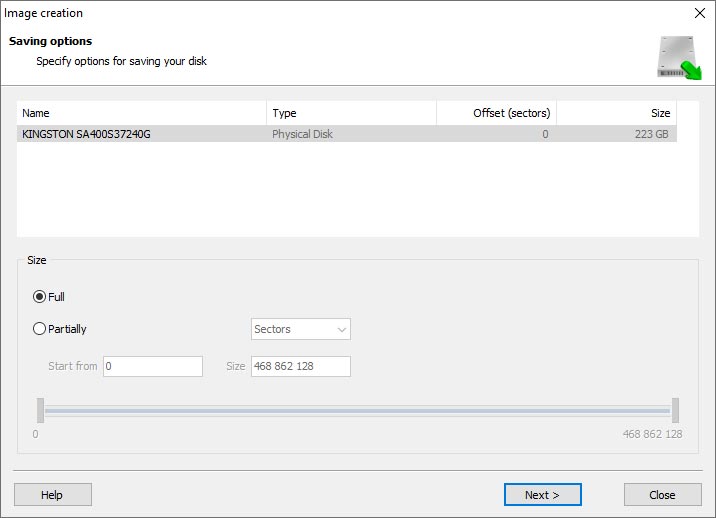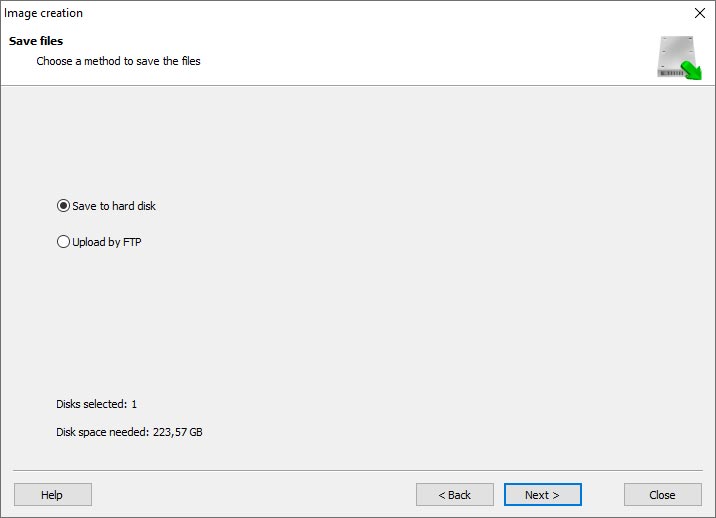
- Why Regular Data Recovery Tools Can’t Restore Files from RAID
- Key Information About the NAS Synology DiskStation DS718+
- How to Remove Hard Disks from Your NAS and Connect Them to a PC
Why Regular Data Recovery Tools Can’t Restore Files from RAID
Conventional hard drives store user data by writing it sequentially across the disk surface, which means an entire file is typically located on a single drive. In contrast, when data is written to a RAID array, each file is split into multiple fragments. These fragments are then distributed and written in sequence across all the drives in the array. Depending on the configuration, fragment sizes can range from 2 KB to 2 MB, so every file is physically stored across several disks at once.
This approach significantly increases read and write performance — after all, writing two halves of a 1 GB file to two drives simultaneously is much faster than writing the full 1 GB to a single disk. However, this same mechanism makes file recovery far more complex.
Different RAID levels use different methods to distribute and protect data. On top of that, manufacturers like Synology often add their own proprietary structures and variations. As a result, data can be written to disks in many different formats, and each requires a specific approach during recovery.
How can regular disk health monitoring and analysis help in preventing potential data loss on NAS Synology DiskStation DS718+ devices?
Regular disk health monitoring and analysis can help in preventing potential data loss on NAS Synology DiskStation DS718+ devices in the following ways:
- Early detection of disk failures: Disk health monitoring tools can regularly scan the disks for any signs of deterioration or potential failures. By monitoring the SMART (Self-Monitoring, Analysis, and Reporting Technology) data of the disks, these tools can identify issues such as bad sectors, high temperature, or abnormal operating conditions. This early detection allows you to proactively replace the failing disk before it completely fails and causes data loss.
- RAID array integrity: Synology DiskStation DS718+ supports various RAID configurations for data redundancy and protection. Regular disk health monitoring ensures that all the disks in the RAID array are functioning properly and are synchronized. It helps identify any inconsistencies or degraded performance in the RAID array, allowing you to take corrective actions to prevent data loss.
- Disk usage and capacity planning: Monitoring disk health also provides insights into the overall disk usage and capacity of the NAS. By analyzing the data, you can identify any potential capacity issues or disk space constraints. This allows you to take necessary actions such as adding more disks or expanding storage capacity to avoid running out of space and potential data loss due to insufficient storage.
- Proactive disk replacement: Disk health monitoring tools can provide alerts and notifications when a disk shows signs of failure or degradation. This enables you to replace the failing disk proactively, minimizing the risk of data loss. By having spare disks ready and monitoring the health status, you can ensure that your data remains protected and accessible.
- Data backup and recovery: Regular disk health monitoring complements data backup strategies. By monitoring the health of the disks, you can ensure that your backup processes are running smoothly and that the backup copies are not compromised. In case of a disk failure, having a recent backup can significantly reduce the impact of data loss and aid in the recovery process.
Overall, regular disk health monitoring and analysis provide proactive insights into the health and performance of the disks in NAS Synology DiskStation DS718+ devices. It helps in identifying potential issues, taking preventive measures, and ensuring the safety and availability of your data.
How to Remove Hard Disks from Your NAS and Connect Them to a PC
Although the NAS DiskStation DS718+ can be accessed over the network, you still need to remove its hard disks and connect them directly to a Windows PC. Only then can the recovery software properly scan and analyze the drives. Follow these steps:
-
Power off the NAS and disconnect it from the power source.
WARNING! Before removing any drives, carefully read the device manual. Improper actions may damage both the NAS enclosure and the hard disks in the RAID array.
-
Remove the hard disks one by one, gently sliding each drive out of its slot. Remember that hard disks are highly sensitive: any impact or drop can cause serious physical damage.
-
Label each hard disk according to its position inside the NAS. The order of the drives is crucial for correct RAID reconstruction.
-
Connect the drives to your computer. In this video, we explain which ports you can use to connect hard disks and what to do if your PC does not have enough free connectors.
Go to view
Step-by-Step Data Recovery with Hetman RAID Recovery

This program restores data from damaged RAID arrays and is fully compatible with Synology DiskStation DS718+. Each hard disk in the array contains technical metadata describing how files were written. When launched, Hetman RAID Recovery analyzes this metadata, automatically reconstructs the damaged array, and provides access to its contents. After that, you can browse the recovered disk and save your files. The program can also restore files that were accidentally deleted from the network drive.

How to recover data from a Synology
DiskStation DS718+ has 2 HDD slots, and it supports the following array types:
- Synology Hybrid RAID;
- RAID 1;
- RAID 0;
- Basic;
- JBOD;
NAS supports:
- Btrfs;
- EXT4;
- EXT3 (External Disk Only);
- FAT32 (External Disk Only);
- exFAT (External Disk Only);
- NTFS (External Disk Only);
- HFS+ (External Disk Only);
How to Safely Recover Data from Disk Images
This utility allows you to create a complete copy of a disk and work with the disk image instead of the physical drive. This approach helps protect your data from:
- Overwriting during the recovery process;
- Additional data loss caused by bad sectors;
- User errors.
To create a disk image, follow these steps:
-
Ensure you have enough free space to store the image. Its size will typically match the size of the original disk.
-
In the main window, select the target disk and choose Tools - Save Disk. You can also select multiple disks if needed.
-
When the Image Creation Wizard opens, select whether you want to save the entire disk or only a specific region. Adjust the settings and click Next.

-
Choose the directory where the image will be saved. You may select any available disk connected to your PC or upload the image via FTP.

Where Are the User’s Files Actually Stored?
The Synology DiskStation DS718+ network-attached storage keeps DSM (DiskStation Manager) operating system files on a separate RAID 1 (mirrored) array. Usually, all NAS systems create several volumes on every hard disk, and the first of them takes up to 2 Gb of space. This is where operating system files are stored. Other volumes are united into a RAID array where user’s data is written.
RAID Recovery Software: Detailed Comparison
| Product | Operating system | RAID controller support | Supported file systems | Virtual RAID controller support | Data recovery from damaged RAID | File preview |
|---|---|---|---|---|---|---|
| Hetman RAID Recovery | Windows, Linux, MacOS | Yes, over 100 controllers | FAT, exFAT, NTFS, ReFS, APFS, HFS+, Ext4, Ext3, Ext2, ReiserFS, Btrfs, VMFS, Hikvision, XFS, UFS, ZFS | Yes | Yes | Yes |
| DiskInternals RAID Recovery | Windows | Yes, over 10 controllers | FAT, NTFS, Ext2/3/4, HFS+ | No | Yes | Yes |
| R-Studio | Windows, Mac, Linux | Yes, over 20 controllers | FAT, NTFS, Ext2/3/4, HFS+ | Yes | Yes | Yes |
| UFS Explorer RAID Recovery | Windows, Mac, Linux | Yes, over 100 controllers | FAT, NTFS, Ext2/3/4, HFS+ | Yes | Yes | Yes |
| EaseUS Data Recovery | Windows | Yes, over 20 controllers | FAT, NTFS, Ext2/3/4, HFS+ | No | Yes | Yes |
| ReclaiMe Free RAID Recovery | Windows | Yes, over 100 controllers | FAT, NTFS, Ext2/3/4, HFS+ | Yes | Yes | Yes |



